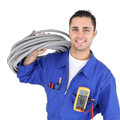5 Tips for electrical safety in your home
Electricity is dangerous - we all know that. But it's easy to underestimate the danger, especially when electrical goods are housed neatly in little white boxes and coated with plastic, completely out of harm's way. Here are a few tips to make your electrics safer!
1. Only use professionals
Electrical work needs to be done by licensed electricians. It's illegal to do your own electrical work, and you can be fined for working on your electrics yourself. Also, your insurance company can refuse your claim if any damage originated from work done by anyone without a licence.
2. Get tested
Prevention is better than a cure, so if you've bought a new home or it's been a long time since you've had an electrician in, book an electrical safety test. A licensed electrician will test your electrical board, your power points, appliances and wiring, and then take any steps to make the electrics safer.
3. Install safety switches
Safety switches are cost effective and protect people from electrical shocks by automatically turning off the power supply if a misconnection occurs. Many homes already have them (it's compulsory for all new homes) but check that you have safety switches and install them if you don't. If you do have them, they should also have a 'test' button so test this regularly (the test result should be that the power turns off).
4. Get a UPS (Uninterruptible power supply)
If you are running a home office or just use the PC a lot, a UPS is a good idea. When power cuts your PC turns off immediately as it has no battery power, and this can damage your hard drive and/or you can lose what you're working on. A UPS is inexpensive and easy to install.
5. Be sensible with your power usage
No one really needs to be reminded of these things, but a couple of common sense items that help you keep electrical accidents to a minimum are things like not using appliances near water, not overloading your powerpoints, putting safety plugs in powerpoints you don't use, etc.
-
If you ever consider purchasing second hand electrical equipment, then each item MUST be tested and tagged and have a prominent tag on the equipment, or it is illegal to sell. Purchasers need to be very wary of buying 2nd hand items at markets or fairs.
over a year ago by Cameron -
Thanks Cameron - that's definitely a very important piece of advice!
over a year ago by pauline.hill


